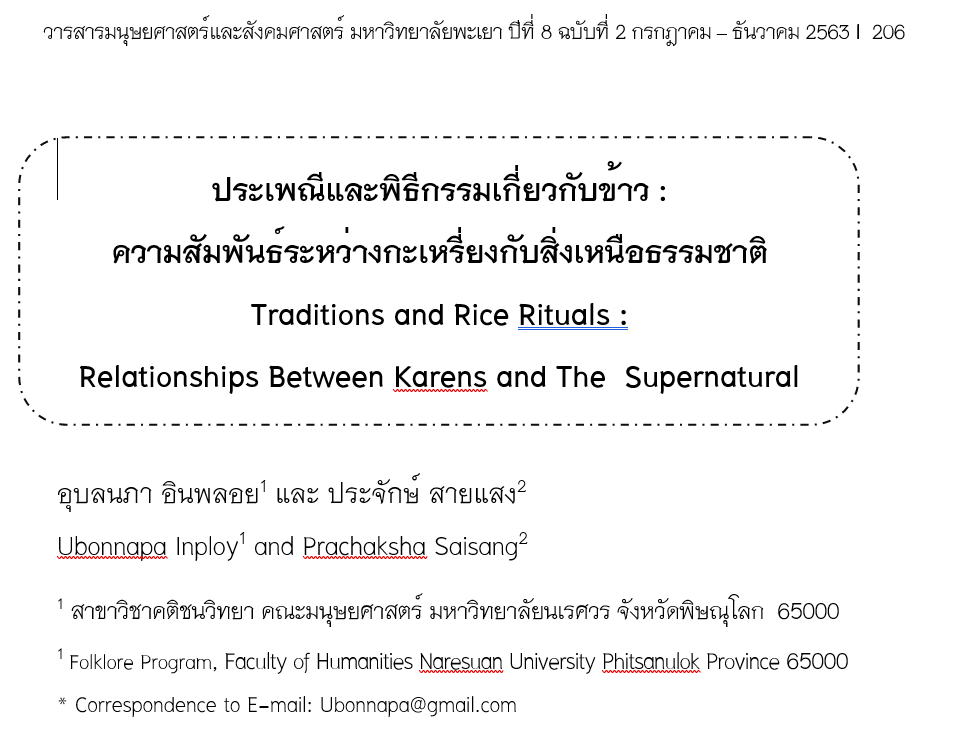Traditions and Rice Rituals : Relationships Between Karens and The Supernatural
Keywords:
Rice, Tradition and rice rituals, Karens, The supernaturalAbstract
This documentary research aimed to investigate traditions and rice rituals, showing the relationship between Karens and the supernatural on the perspective of folklore on 3rd dimensions, that is, mythology. The documents for study were both in Thai and in English. Two research sub-topics under the study were as follows: 1) traditions and rice rituals of the Karens and 2) relationships between Karens and the supernatural in traditions and rice rituals.
The research results revealed that 1) the Karens originally paid homage to spirits which usually inhibited in nature. Although they later on have practiced Buddhism and Christianity, spirits still have an important role in their lives, particularly on rice growing. All 12 months, Karen would conduct rituals and rice ceremonies and would stick to the rituals related to rice producing processes and 2) rice rituals were symbols of connection to the supernatural, signifying the relationship between the Karens, nature, and the supernatural. All actions connected to rice rituals were the symbols of ‘requests’ and ‘thanks’, so ‘rice’ is regarded as being in holy status, like nature around us, which is also in holy status. Rice connects humans to nature of all things, including lands, rivers, mountains, forests, and universe.
References
กรมพัฒนาสังคมและสวัสดิการ. (2555). กะเหรี่ยง. กรุงเทพฯ: สำนักงานกิจการโรงพิมพ์ องค์การสงเคราะห์ทหารผ่านศึก.
กรกนก สนิทการ. (2561). การศึกษาคุณลักษณะของสื่อประเพณีการจองพาราและการนำไปใช้ในการท่องเที่ยวเชิงวัฒนธรรมของจังหวัดแม่ฮ่องสอน. วารสารมนุษยศาสตร์และสังคมศาสตร์ มหาวิทยาลัยพะเยา, 6(1), 123-143. ได้จาก: https://so03.tci-thaijo.org/index.php/Humanties-up/article/view/196657/136700
กิ่งแก้ว อัตถากร. (2552 ก). การศึกษาคติชนคดีใน 3 มิติ. ใน เอกสารประกอบคำบรรยายในงานนเรศวรวิจัย: การตื่นตัวสู่มิติแห่งความลึกลับทางจิตและทางเทพปกรณัมด้วยวิธีการค้นคว้าด้วยปัญญาวิเคราะห์. พิษณุโลก: มหาวิทยาลัยนเรศวร, 13-15.
______________. (2552 ข). พิธีกรรมคือการเชื่อมโยง. วารสารมนุษยศาสตร์ มหาวิทยาลัยนเรศวร. 6 (เดือนมกราคม-เมษายน), 1-10.
กุลวดี บุญภินนท์. (2536). วิถีชีวิตกะเหรี่ยง: วิถีแห่งความผูกพันกับธรรมชาติ กรณีศึกษา: หมู่บ้านสะเนพ่องและกองม่องทะ อำเภอสังขละบุรี จังหวัดกาญจนบุรี. วารสารนิเวศวิทยา. 20(3), 43-56.
โกวิท แก้วสุวรรณ. (2543). ทู่รู่เหมยเบี่ย : กิจกรรมจารีตประเพณีของกะเหรี่ยงโป ตำบลไล่โว่ อำเภอสังขละบุรี. วารสารมหาวิทยาลัยศิลปากร. 19-20(1), 133-163.
ปฐม หงษ์สุวรรณ. (2550). กาลครั้งหนึ่ง: ว่าด้วยตำนานกับวัฒนธรรม (พิมพ์ครั้งที่ 2). กรุงเทพฯ: แอคทีฟ พริ้นท์.
ประคอง นิมมานเหมินท์, ยรรยง จิระนคร, ศิราพร ณ ถลาง และสุกัญญา สุจฉายา. (2560). คติชนคนไทยในวัฒนธรรมข้าว. กรุงเทพฯ: สถาบันไทยศึกษาจุฬาลงกรณ์มหาวิทยาลัย.
ประจักษ์ สายแสง. (ม.ป.ป.). คติชนอาเซียน. พิษณุโลก: มหาวิทยาลัยนเรศวร.
ประเวศ วะสี. (2557). ขวัญข้าว ขวัญเรา. กรุงเทพฯ: มูลนิธิข้าวไทย.
ปิ่นแก้ว เหลืองอร่ามศรี. (2539). ภูมิปัญญานิเวศวิทยาชนพื้นเมือง: ศึกษากรณีชุมชนกะเหรี่ยงในป่าทุ่งใหญ่นเรศวร. นนทบุรี: โลกดุลยภาพ.
_____________. (2536). พุทธ-ผี-ธรรมชาติ และมนุษย์: จักรวาลวิทยาของคนกะเหรี่ยงในทุ่งใหญ่. เมืองโบราณ, 19(4), 21-30.
สมชาย ศรีสุข. (2556). ประเพณีพิธีกรรม 12 เดือน. ม.ป.ท.: ม.ป.พ.
สุภัทรดิศ ดิศกุล, ม.ร.ว. (2547). ศาสนาพราหมณ์ในอาณาจักรขอม. กรุงเทพฯ: มติชน.
เอื้อมพร จรนามล. (2556). โลกทัศน์ที่ปรากฏในนิทานพื้นบ้านไทลื้อ อำเภอเชียงคำ จังหวัดพะเยา. วารสารมนุษยศาสตร์และสังคมศาสตร์ มหาวิทยาลัยพะเยา, 1(3), 28-38. ได้จาก: https://so03.tci-thaijo.org/index.php/Humanties-up/article/view/42720
แอลดัส ฮักส์ลีย์. (2556). ปรัชญาอมตะ. (กิ่งแก้ว อัตถากร, ผู้แปล). นนทบุรี: อมรินทร์บุ๊คเซ็นเตอร์. (ต้นฉบับภาษาอังกฤษ พิมพ์ ค.ศ. 1945).
Eliade, Mircea. (1972). Patterns in Comparative Religion. (8th ed.). United States of America: The World Publishing Company.
Marshall, H. I. (1997). The Karen People of Burma: A Study in Anthropology and Ethnology. Thailand: White Lotus.

Downloads
Published
How to Cite
Issue
Section
License
ผู้นิพนธ์ต้องรับผิดชอบข้อความในบทนิพนธ์ของตน มหาวิทยาลัยพะเยาไม่จำเป็นต้องเห็นด้วยกับบทความที่ตีพิมพ์เสมอไป ผู้สนใจสามารถคัดลอก และนำไปใช้ได้ แต่จะต้องขออนุมัติเจ้าของ และได้รับการอนุมัติเป็นลายลักษณ์อักษรก่อน พร้อมกับมีการอ้างอิงและกล่าวคำขอบคุณให้ถูกต้องด้วย
The authors are themselves responsible for their contents. Signed articles may not always reflect the opinion of University of Phayao. The articles can be reproduced and reprinted, provided that permission is given by the authors and acknowledgement must be given.







